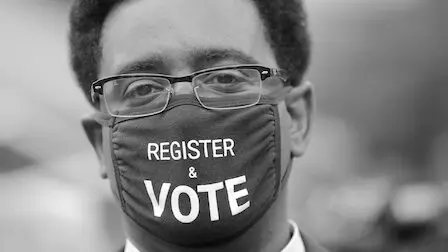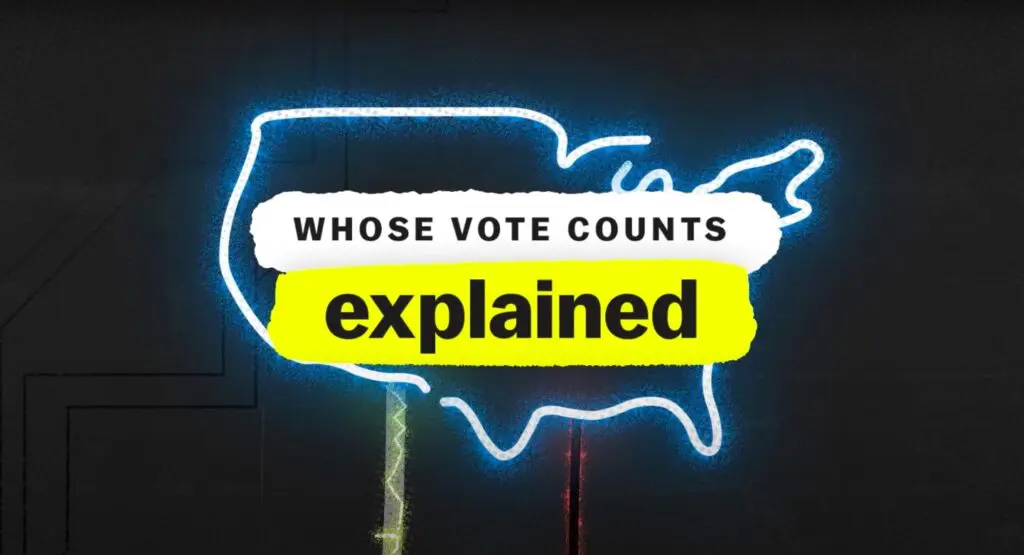Summary
Vox continues solid work with Netflix on Whose Vote Counts, Explained, a three-episode primer on American democracy that seems more crucial now than ever.
Whose Vote Counts, Explained Season 1 debuted on Netflix on September 28, 2020. You can read our recap of the show’s previous one-off special episode by clicking these words.
With the elections looming ever-closer like some kind of cultural final boss, now seems as good a time as any to explore the topic of voting – why it matters, why people think it doesn’t, what political apathy might mean for the future of the world’s largest and most influential republic, and which celebrities echo your own political point of view.
That last bit seems unusually on-the-nose for Vox’s collaborations with Netflix under the Explained umbrella, which have all prided themselves on their digestible, informational style, with the use of smart, clean graphics and to-the-point testimony making up for an obviously left-leaning slant. I’ve enjoyed all of them and found them all useful, especially the off-the-cuff one-off special Coronavirus, Explained, but Whose Vote Counts doesn’t seem concerned about making its position too clear. Leonardo DiCaprio, Selena Gomez, and John Legend, all famously liberal celebrities, are wheeled out for narration duties across “The right to vote”, “Can you buy an election?”, and the titular “Whose vote counts?”, the three half-hour episodes that comprise this new miniseries on America’s democratic process.

Slant shouldn’t seem too much of a problem here, since voting isn’t exactly a bipartisan issue in and of itself – both sides of the political aisle agree it’s important, nay vital, and it’s the parties and candidates one prefers that create the debate. That debate isn’t just about who you’re voting for, though, or even why you’re voting for them – it’s about what your complicity in the national system means for you, for that system, and for the country.
Nobody in their right mind could say with a straight face that all citizens are given equal treatment in America – Amazon’s recent documentary feature All In: The Fight for Democracy made this point in relation to voting and voter suppression specifically, and how marginalized communities become disenfranchised with the political system after being made, through a variety of means, to feel as if their vote doesn’t count. This is the biggest justification for why Americans vote at a lower rate than citizens in other developed countries, and the source of this disenfranchisement and the relationship the election cycle has to money, big business, and other forms of subtle and not-so-subtle rigging, are among the subjects discussed in Whose Vote Counts, Explained.
The series combines Explained’s usual documentarian flourishes – reams of data made bite-sized, delivered in clear terms – with an unusually pressing sense of these issues coming to a head right here, right now, more so than ever. This is especially true in the wake of a pandemic that has helped to fundamentally alter the voting system and a Presidential Administration that has convinced more people than ever that change must come – and sooner rather than later. Since voting is the only way within a democracy to enact real change – ostensibly, anyway – the energy surrounding this debate is at a fever pitch. Crucially, Whose Vote Counts acknowledges the way this system is insufficient and open to exploitation and proposes not just the potential of significant reform but the renewed drive for more representative democracy across the board. The show’s question of whose vote matters turns out to be an obvious one: Yours.
Thanks for reading our review of Whose Vote Counts, Explained.




